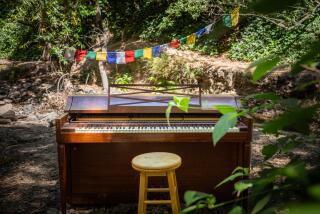Requiem Sounds for Germany’s World-Renowned Piano Manufacturer : Berlin: Composers have proclaimed Bechsteins ‘superior to all others’ and ‘the most beautiful and most refined.’ But the firm has filed for bankruptcy, victim of high costs, low demand, mass production.
- Share via
BERLIN — “One should write piano music only for Bechstein pianos,” composer Claude Debussy advised. Franz Liszt considered Bechsteins “superior to all other pianos.” Richard Strauss pronounced them “the most beautiful and most refined in the world.”
From Richard Wagner and Bela Bartok to Duke Ellington and Chick Corea, the rich, subtle tones of Bechstein grands have drawn plaudits for 140 years. Now, however, the sole survivor of Berlin’s once-thriving piano industry is hearing only a Requiem. Bechstein Piano Factory has applied for bankruptcy, a victim of high costs, low demand and Japanese mass production.
Unless an unexpected buyer appears or the Berlin Senate approves a bailout, venerable Bechstein will follow more than 200 other Berlin piano makers into oblivion. The firm’s remaining 63 employees--down from 1,000 during the salad days of the last century--will be put on the street. The exotic art of making a grand piano almost entirely by hand will move a bit closer to extinction.
The reasons are partly economic, partly social. Worldwide recession has led to a reduction in total piano production from nearly 1 million in 1990 to 600,000 last year. “The industry is very hard up,” said Leonardo Duricic, Bechstein’s export director. “1991 was a difficult year in selling pianos; ’92 was a terrible year, especially for grand pianos.”
Japanese and Korean manufacturers have cornered much of the remaining market with the same kind of automation and cost-cutting production measures that worked in the automobile and videocassette recorder industries. Yamaha alone reportedly makes 100,000 pianos a year, far more than all 20 German firms combined.
Bechstein, which once built 5,000 pianos annually, now produces about 100 grands and 500 uprights a year; prices range from $10,000 for the Studio 115 upright to $66,000 for the 9-foot-long EN concert grand.
Many craftsmen doubt that piano production will ever fully recover its former vigor. Long gone are the days, as Duricic observed, “when a piano was what a television is today, when every proper house had one.” Some blame the ethic of modern children--and their parents--who see endless hours at the keyboard as pointless drudgery. Others note the innumerable distractions of contemporary life, from Nintendo to TV to weekend soccer games.
The fate of Bechstein’s workers is uncertain at best. The bankruptcy application caught everyone in the shop by surprise. Christophorus Goecke, a 32-year-old master craftsman who has worked at the plant for five years, says his colleagues “are definitely not hanging their heads,” but “on the other hand they know that it’s practically impossible to find work now as a piano builder.”
For experienced hands, there is still demand for refurbishing old instruments; younger employees, however, may be forced to seek retraining in a different field.
“Piano making is a very old tradition, closely tied to musical and cultural traditions in Germany,” added Goecke, who also has worked as a cabinetmaker and harpsichord builder. “It would be a pity if the skills of making new instruments disappeared in this country.”
Under a mortgage arrangement Bechstein made with Berlin in 1988, the city has the right to buy back property it sold to the company for less than $12 million--a reasonable price before reunification sent real estate values soaring. Duricic hopes the Berlin Senate will instead offer “fair market value” of $20 million to $25 million, which he says is enough to get out of debt and tide the company over until better times. Some real estate experts have estimated that in a few years, when Berlin has fully emerged as the capital of Germany, the property could be worth more than $100 million.
For Duricic, who was born in Yugoslavia and reared in Philadelphia, then moved to Germany in 1979 to study piano-making, the issue is about much more than property values. “It’s an attempt to preserve something very lyrical, something with a tremendous amount of subtlety,” he said. “I am not a gifted pianist, but I love this instrument.”
More to Read
The biggest entertainment stories
Get our big stories about Hollywood, film, television, music, arts, culture and more right in your inbox as soon as they publish.
You may occasionally receive promotional content from the Los Angeles Times.










